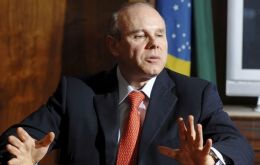MercoPress. South Atlantic News Agency
Stories for November 19th 2009
-
Friday, November 20th 2009 - 05:49 UTC
Ten-year input for the Atlas of the Patagonian marine ecosystem

The Wildlife Conservation Society (WCS) and BirdLife International have released the first-ever comprehensive atlas of the Patagonian Sea -- a globally important but poorly understood South American marine ecosystem.
-
Friday, November 20th 2009 - 02:47 UTC
Uruguayan incumbent presidential candidate leads by 6 points in polls

With only ten days for the Uruguayan presidential run-off, incumbent candidate Jose Pepe Mujica leads with 48% vote intention while his rival Luis Alberto Lacalle stands at 42% and the undecided 10%, according to the latest public opinion poll released Thursday by a Montevideo newspaper.
-
Friday, November 20th 2009 - 02:33 UTC
Cuban greetings for 2010: tighten your belts, it’s bad and it’s getting worse

Cuba is going through one of its cyclical “hard moments” but this time the lack of foreign currency is forcing draconian cuts in food subsidies, public utilities and other services taken for granted. The media repeatedly calls on the population to “tighten belts” because in 2010 restrictions are “for worse”.
-
Friday, November 20th 2009 - 02:17 UTC
Brazil, Mexico and Chile out of recession beginning 2010, says OECD

The Brazilian economy will experience a robust growth in 2010 and 2011, in the range of 4.5%, while Mexico will recover from deep recession beginning next year with a GDP expansion of 2.7% and 3.9% in 2011, according to the Organization for Economic and Development Cooperation, OECD.
-
Friday, November 20th 2009 - 02:11 UTC
OECD warns UK jobless could reach 9.5% by 2011

United Kingdom’s jobless rate could soar to 9.5% in two years' time, even after the economy begins to recover, a leading economic body has warned.
-
Friday, November 20th 2009 - 02:09 UTC
Santiago airport expansion and fast train plans unveiled by Chile

The Chilean government this week unveiled two major public transport initiatives aimed upgrading the nation’s transport infrastructure: a third runway and expanded terminal at the Arturo Merino Benitez International Airport (AMB) and a fast train service connecting the airport to the port city of Valparaiso in 2010.
-
Thursday, November 19th 2009 - 13:26 UTC
Russia opens its first embassy ever in Paraguay’s 200 year history

The Russian Federation has formally opened its first embassy in Paraguay’s 200 year history. Although there have been diplomatic relations the Russian ambassador was concurrent from Buenos Aires and only since two decades ago.
-
Thursday, November 19th 2009 - 13:23 UTC
Brazil/Argentina agree trade differences should not influence political relation

Brazil and Argentina ended Wednesday in Brasilia a full day of talks at presidential level without reaching a clear agreement on trade disputes that have caused disruptions to the bilateral relation.
-
Thursday, November 19th 2009 - 13:20 UTC
Brazil unveils tax on ADR to help contain appreciation of the Real

Brazil took another step on Wednesday aimed at containing the appreciation of its currency, unveiling a 1.5% tax on certain trades involving American Depository Receipts, ADR, issued by Brazilian companies. Finance minister Guido Mantega said the tax will be charged when foreign investors convert ADRs for Brazilian companies into receipts for shares issued locally.
-
Thursday, November 19th 2009 - 13:18 UTC
Argentine Senate reopens debt restructuring process for bond holdouts

Argentina’s Senate passed a bill on Wednesday with a significant majority to reopen the country's 2005 debt restructuring. The administration of President Cristina Fernandez de Kirchner hopes it will help it settle a dispute with holders of an estimated 20 billion US dollars in defaulted bonds.
